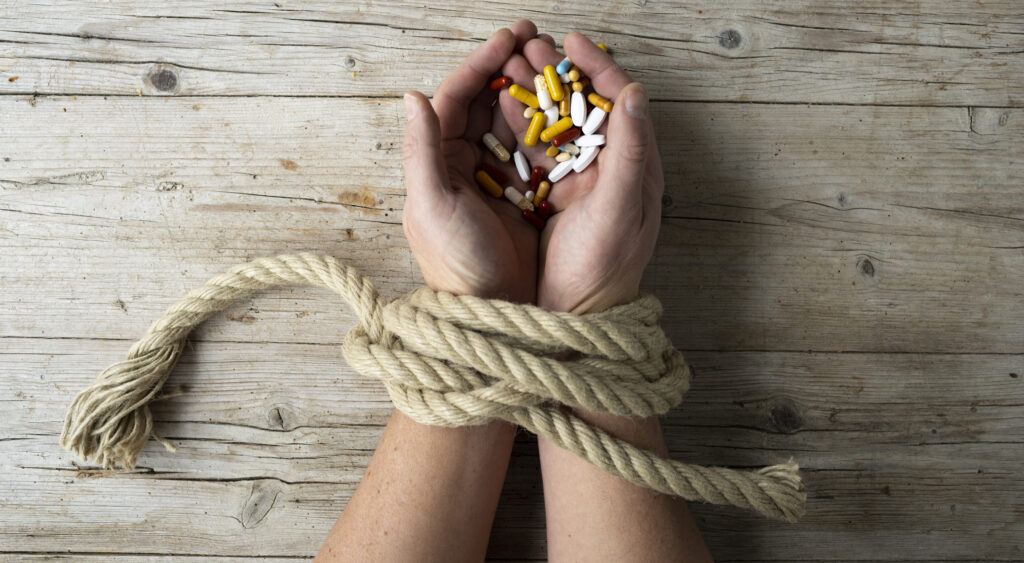Psychedelic-assisted therapy in the treatment of addiction
Posted on 28 October, 2024 in News

Research into the use of psychedelics for treatment of addiction
Before the introduction of legislation that limited access to psychedelics, research groups published data indicating a possible role for psychedelic-assisted psychotherapy for treatment of addictions, including alcoholism.
To assess the effectiveness of any drug, researchers use a study method to minimise bias called a randomised controlled trial.
Participants are split into two groups and do not know which group they are assigned to:
- one group receives the drug treatment
- one group receives a placebo (and is called the control group)
In some trials researchers choose to use an active placebo as a control. This is a drug chosen because it mimics some of the effects of the drug being tested, to reduce the risk of risk participants knowing if they have received the psychedelic drug being tested or not.
Alcohol use disorder
Two studies have shown some evidence that psilocybin is effective for people with a diagnosis of alcohol use disorder.
The largest clinical study was a randomised control trial with 93 participants. Those who received two high doses of psilocybin and psychotherapy over 12 weeks had a significant reduction in heavy drinking days over 36-weeks compared to those receiving psychotherapy with a placebo drug. No serious adverse events were reported.
This followed a smaller feasibility trial involving 10 participants, in which those participants receiving high doses of psilocybin in addition to talking therapy reported reduced heavy drinking days and reduced craving at 36 weeks.
Nicotine dependence
A small study had 15 participants who smoked at least 10 cigarettes per day and had previously tried but failed to quit smoking. Participants received 3 doses of psilocybin during a 15 week smoking cessation treatment. Of these, 12 participants (80%) were abstinent from smoking at 6-month follow-up. Eleven of the 12 participants who quit did so within one week of the first psilocybin dose. This was confirmed with blood tests that can chemically detect smoking status within the previous 7 days.
At long-term follow-up, nine participants (60%) were confirmed as smoking abstinent.
the study design in this case means the findings should be interpreted with caution until more robust data is collected. Such a trial is ongoing through Johns Hopkins University in the US.
Gambling addiction
A new pilot brain imaging and clinical research study was announced by Imperial College in 2023. The study will collaborate with the specialist NHS Gambling Clinic.
Other addictions
Early clinical studies are taking place across the UK, Europe, Canada and the US in universities and pharmaceutical companies.
Ketamine
In a US study, 40 individuals with alcohol dependence undertook a 5-week period of motivational enhancement therapy. Ketamine significantly increased the likelihood of alcohol abstinence, delayed the time to relapse, and reduced the likelihood of heavy drinking days compared with the control group.
A subsequent UK study recruited 96 participants with alcohol dependence to a randomised control trial. They were administered with ketamine infusions over a period of weeks in addition to psychological therapy. There were a significantly greater number of days abstinent from alcohol in the ketamine and psychotherapy group compared with the placebo and psychoeducation group at 6-month follow-up.
There is an ongoing larger UK-based phase III clinical trial (MORE-KARE) which aims to add more data to the evidence base across several sites treating alcohol dependence with ketamine-assisted psychotherapy.
MDMA
In a proof-of-concept study on alcohol use disorder (AUD), the safety and tolerability of MDMA was evaluated in 14 patients. The study also looked at psychological and physiological outcomes. All participants tolerated MDMA well, and no severe adverse events were reported. Additionally, at 9 months after the study, participants’ average alcohol consumption reduced from 130.6 units per week before the trial to 18.7 units per week.
Are psychedelic drugs addictive?
Research has examined whether psychedelic drugs are themselves addictive. They are not generally considered to be addictive (called abuse potential in research), although there are concerns about ketamine.
Ongoing and future research
Trials have been announced focussing on ibogaine for alcohol dependence, and for both opioid withdrawal and dependence. Clinical research is underway on short-acting psychedelics including 5-meo-dmt for alcohol dependence.
Recent government funding has supported clinical and mechanistic research of psychedelics to treatment substance addiction. Most studies are undertaken in the biotechnology and pharmaceutical sectors and in academic centres. In the UK these include Imperial College London, University College London, Exeter University and King’s College London.
